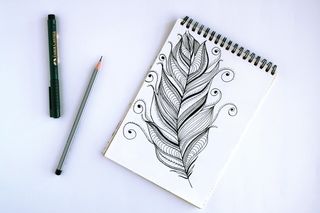Anxiety
Are Adult Coloring Books Actually Helpful?
Exploring the mental health benefits of the coloring book trend.
Posted March 27, 2018 Reviewed by Jessica Schrader
Within the last decade adult coloring books have surged in popularity. The vast selection available today includes abstract images, mandalas, and your beloved characters ranging from Marvel to Disney, and anything in between (like famous Facebook kitty, Pusheen). If you prefer, you can shift the scenery as you explore a secret garden, lost ocean, or perhaps an enchanted forest. Themes aside, these activity books have often been best sellers and claim to provide users with the opportunity to connect with their inner artists, reduce stress, and live happier lives.
But do they?

I’ve heard friends, family, students, and clients all share their personal pleasant experiences with adult coloring books. And honestly, I truly enjoy my own. I recognize that just because my personal interpretation tends to be echoed in those around me, that doesn’t mean that an illustration a day keeps the woes away. Yet noticing this widespread phenomenon caused me to consider that coloring could indeed be broadly therapeutic.
But what is so appealing?
- Is it the nostalgia for the free coloring we experienced as children?
- Perhaps it gives us a creative outlet to break our rigid routines?
- Or could it be the mindfulness achieved as we disconnect from chaos and connecting to the present?
Previous studies have provided support for adult coloring books. Curry and Kasser induced anxiety in a group of undergraduates, provided them either with a blank page, a plaid print, or a mandala, and instructed them to color for 20 minutes. Both designs reduced anxiety, although the mandala was slightly more effective. However, in a replication study by van der Vennet and Serice, no difference was observed between for those who had plaid and blank pages, yet the mandala group still displayed a reduction in anxiety.
In a recent study, Mantzios and Giannou utilized randomized controlled experiments to explore the differences between coloring and free-drawing. In one experiment there were no differences in between an unguided coloring group and free-drawing. However, in the second experiment participants were assigned to either a guided or unguided mandala coloring group, and although no differences were noted in mindfulness, those in the guided group did show a reduction in anxiety.
Researchers at the International Islamic University Islamabad delved further into the potential to reduce anxiety. In a quasi-experimental study it was found that the use of mandalas was able to decrease both state anxiety (i.e. contextual emotional experience) and trait anxiety (i.e. personality characteristic) in just 30 minutes, however, the difference in state anxiety was almost twice that of the difference noted in trait anxiety.

Adult coloring books have been shown to influence more than anxiety. Researchers at the University of Otago randomly assigned participants to a coloring a logic-puzzle group and found that after a week of daily practice displayed significantly lower levels of anxiety and depressive symptoms. In a study of individuals ages 19-67 participants engaged in coloring independently and in an open studio environment with an art therapist. Both scenarios helped participants to reduce stress and negative affect, however, the session with the art therapist prompted significant enhancements of personal perceptions pertaining to creativity, self-efficacy, and positive effect.
It seems as though adult coloring books are therapeutic, but they aren’t therapy.
There may be benefits to improving mood, enhancing mindfulness, and reducing mental health stress, but the personal process may be distinct from the growth one encounters in therapy. If you do enjoy this artistic activity and hope to improve your mental health, perhaps you may benefit from seeking a creative practitioner or an art therapist to help you along your journey.


